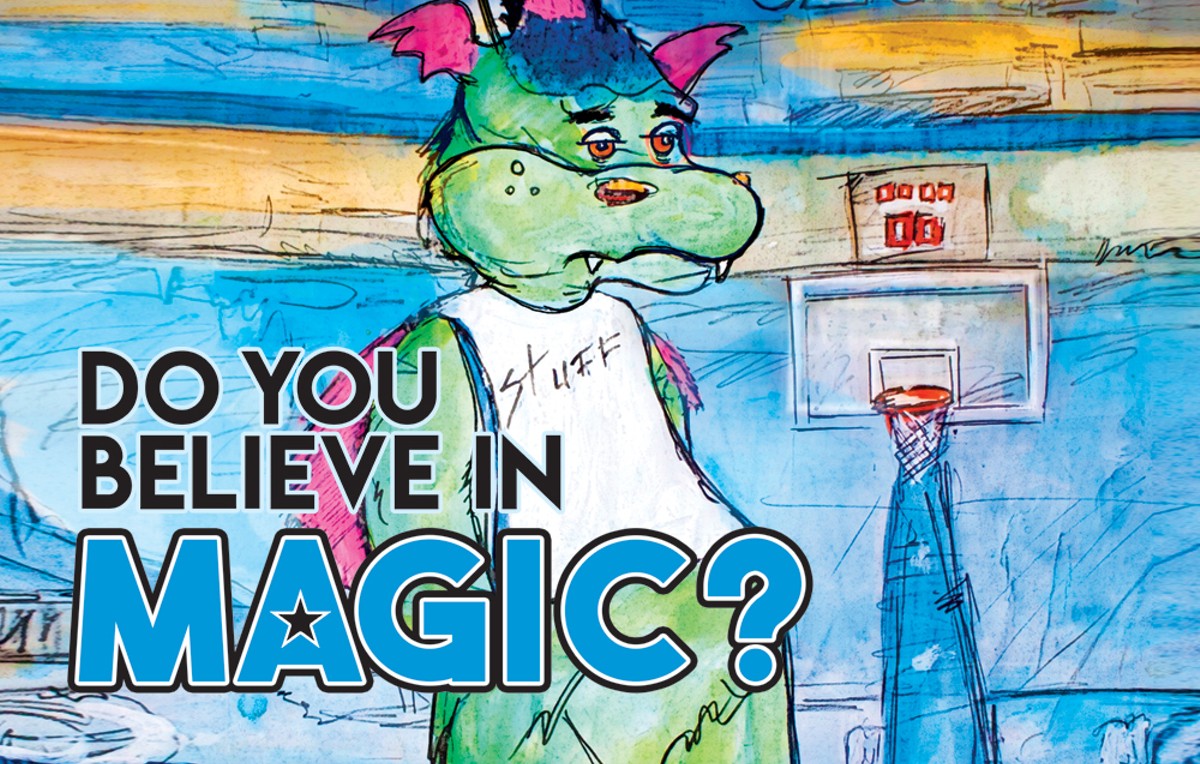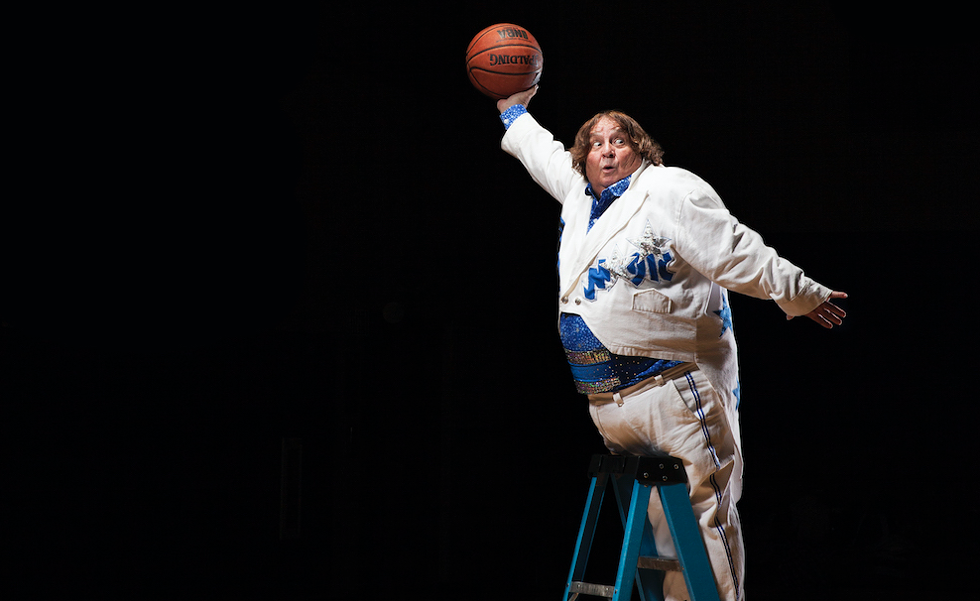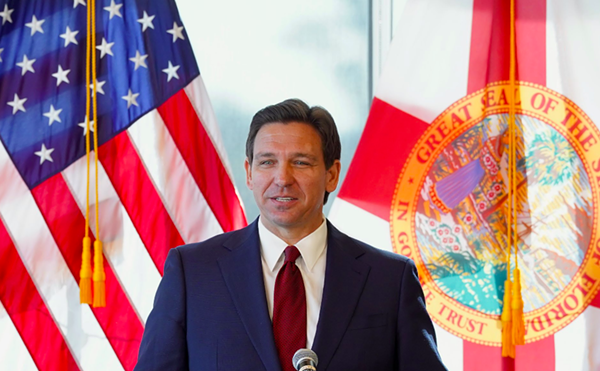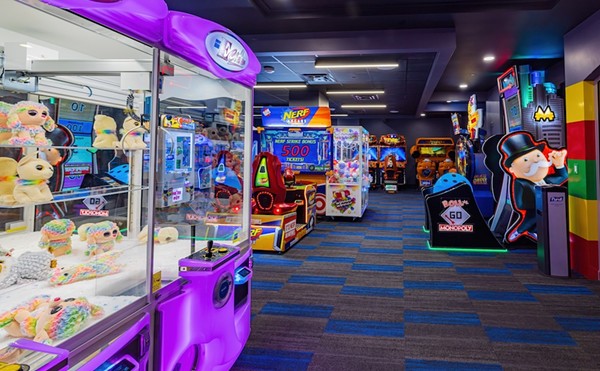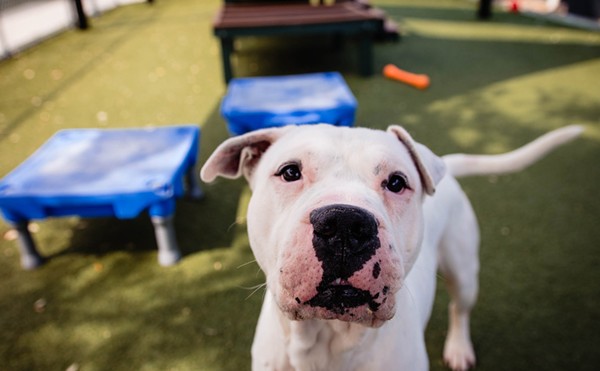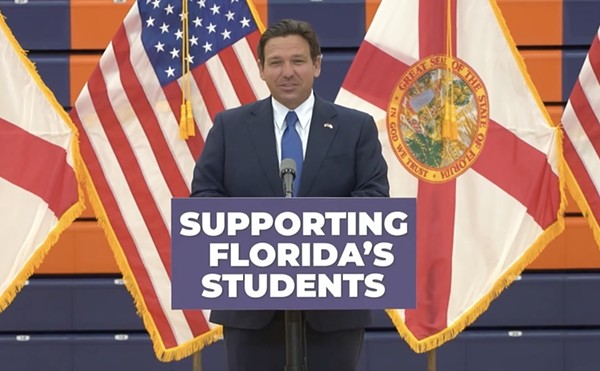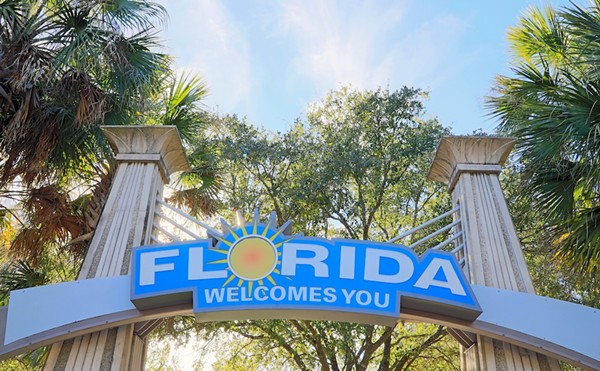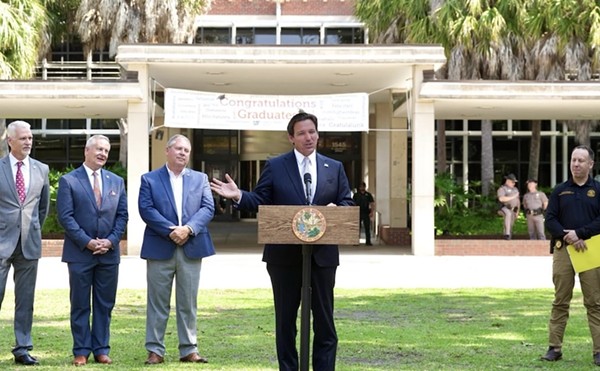Dennis Salvagio isn't a bandwagon type of guy, OK?
"I'm living with – what is it? – love, honor and obey," Salvagio says, as he sits at the kitchen table inside his family's large light-pink home in rural Chuluota. It's a secular point of view for a sports fan, borrowed from his lifelong Catholic faith and similar to the time-honored vows he took with his wife of 45 years, Mary, who's standing in the kitchen. "I'm living with that kind of loyalty to my team."
Salvagio, 69, stands at a squat five-foot-four and 240 pounds. Still, his charisma is evident the moment you shake his hand. He's personable but quick and to the point – a mannerism developed through his career as a criminal defense attorney, from which he's now retired. He's outgoing, a competitive ballroom dancer who has traveled to more than 60 countries. He's kind, the type of man who would give you the shirt off his back, with brown eyes that flicker when the corners of his smile twist beneath the mantle of his round face.
As charming as he is, what stands out most about Salvagio is the fact that he's a firebrand super-fan of the Orlando Magic, the type of zealot who only misses three or four home games each season. In fact, if you've been to a Magic home game over the last 29 years, you've probably witnessed Salvagio in action at some point: He's the rabid fan who's usually jogging around the court when the game gets close or heads into overtime, at times fully dressed in custom-made Magic regalia, looking like an Orlandoan Evel Knievel.
But that seems to be happening less and less frequently. Magic games are rarely tight these days. Simply put, the team is downright awful.
"Everybody talks to me. I know when they're doing bad, because people will come up to me and say, 'Oh, they're terrible, blah, blah, blah. They're tanking it,'" Salvagio says. "I hear all that from everybody, OK?"
It's early March, just a couple hours before the Magic tip off against the Utah Jazz in Salt Lake City. Predictably enough, the Magic will go on to lose in ugly fashion.
"We're messing up," Salvagio says flatly.
The conversation feels somewhere between therapeutic and abrasive. Most sports enthusiasts can relate, especially the losing kind, and most especially die-hards like Salvagio. He, like anyone who's had their heart dragged through the muck of suck, understands how the howling pain of defeat is only worsened when a franchise has a long rebuilding process to look forward to. In the case of the Magic, that process has yet to make a difference – not this season, not last season, not the season before, nor the season prior to that. The list goes on in losing accord, as have the bad upper-management hires and wasted draft picks and backfiring trades.
So what happened to the Magic? While hard-core fans like Salvagio have maintained their love, honor and obey approach, other local sports aficionados have opted to cuss, holler and pray. How much longer will fans have to wait until that abracadabra moment, when everything finally comes together? How much longer can the Magic continue its losing ways before a mutiny between team and fans takes place?
Or has it already?
If you're going to understand Salvagio as a fan, you have to understand the folkloric manner in which he earned the nickname the "Fat Guy."
The date was March 3, 1990. The Magic's inaugural season was entering the backstretch. Salvagio, his eldest son, Anthony, and two of Salvagio's close friends were sitting in the stands of Orlando Arena, Section 102, Row L. The first overtime period was underway, a nail-biter against the Washington Bullets, and the Magic's new-to-this crowd wasn't as enthused as Salvagio would have liked.
So Salvagio, being the bon vivant he is, stood up and began to dance. Well, not so much dance. Think of it more like a manic shake of the body, as if the NBA's holy ghost had come over him. His wild mop of hair flew, adding to his off-his-rocker aesthetic. The extra skin on his frame took a moment to catch up to his body's quick jolts. Salvagio was in his element: jovial, merrily manic, loose. Magic fans had yet to see anyone like him.
The sold out crowd – all 15,077 of them – was enthralled. According to an article published in the Orlando Sentinel the next day, when Salvagio stood up to shake out his Magic jitters, Orlando Arena sound technicians said the crowd's roar grew to 120 decibels – then the loudest ever recorded in the arena.
The camera guy noticed as well. "You're up on the screen," Salvagio's friend told him. So Salvagio sat down, but the crowd cheered him back to his feet. He kept on dancing.
The Magic lost in double overtime that night, but it didn't stop there. The next day, as a way to track down the dancing stranger, Sentinel reporter Bill Marx wrote a rather unflattering poem in ode to the man he dubbed the Fat Guy: "The Round Mound of O-Town. To you, Mr. Fat Guy, I give this humble offering, hoping you will accept it graciously and return to the O-rena for more of the Fat Guy Shuffle ... The Fat Guy can boogie, The Fat Guy can dance. ... Weight left – BOOM! Weight right – BOOM! Shimmy shimmy shake shake boom boom boom!"
At the bottom of the poem, a note read: "If the Fat Guy's out there, tell him to give me a call."
As one of Salvagio's sons drove him to Sunday Mass, the newly dubbed Fat Guy noticed Marx's poem while flipping through the paper. He followed up with the reporter.
"So I call the Sentinel and I says, 'Is Bill Marx there?'" Salvagio says, the subtleties of his native Philly accent making an appearance. "And they said no, and I says, 'Well, tell him the Fat Guy called.' And he called me right back."
Salvagio adds: "I thought I would have my 15 minutes of fame and it'd be over. But the next game people brought signs to the arena – 'Fat Guy!' It was incredible."
The rest was history. Salvagio, a natural showboat, couldn't argue with the persona bestowed upon him. The Fat Guy's legacy would only cement itself when he made a tradition out of running laps around the O-rena. He became a sort of cult figure around town, and beyond: In 1991, Salvagio was even named fan of the year by the NBA's television show Inside Stuff.
The Fat Guy's persona helped Salvagio bond with the Magic, and they to him. But that doesn't mean he's been immune to the tragedy that's become synonymous with the team over the past several years. The same goes for his wife, Mary, who's been by her husband's side through thick and thin with the Magic.
"When Shaq left," Mary says in her soft-spoken tone, pausing for a moment as if she's paying her respects to a dead loved one. (She's, of course, referring to Shaquille O'Neal, whom the Magic drafted first overall in the 1992 NBA Draft before he left town in 1996 for a seven-year, $121 million contract with the Lakers.) "I'll never forget it, because I was listening to the radio while they were making that decision. And then, when he picked up the L.A. hat, it felt like I was punched in the stomach."
Salvagio only offers one word on the matter: "Betrayal."
Like a bad taste in your mouth, betrayal has a way of sticking around long after the deed is done. But broken hearts have a way of mending, at least until they're broken again.
In the waning hours of April 11, the Magic put the finishing touches on the franchise's sad 29th season. Since the opening tipoff against the Miami Heat in October, most observers expected a losing season, considering how the Magic have consistently flailed over the past several years.
What wasn't expected, however, was just how badly this season would actually go. By mid-April, the team had only managed to produce 25 wins against 57 losses. They fired head coach Frank Vogel after finishing among the NBA's basement-dwellers, again, second to last in the Eastern Conference – one game ahead of the equally miserable Atlanta Hawks. Which is all just a sports-speak way of tip-toeing around the fact that the Magic are fucking terrible.
At times play this season has been so appalling that some fans have drank the season's-end Kool-Aid, hoping the Magic will tank the remainder of the season for the sake of bettering the team's odds in the NBA Draft lottery. Making matters worse, with a number of NBA teams doing equally as bad as the Magic, they're all essentially in a race to see who can suck the worst.
But even if some folks consider it theoretically sound to finish last for draft purposes, what sort of fan celebrates a team with one of the worst records in the NBA? What's there to hoot and holler over when the Magic can't even win 30 games?
Sure, there have been moments of blissful brilliance for Magic teams over the years. Take the night of May 7, 1995, Game 1 of the Eastern Conference semifinals. The only thing standing between the Magic's first win of the series was the Chicago Bulls and a 32-year-old Michael Jordan. With 18 seconds left on the clock, the Magic were down by one and the ball was in Jordan's holy hands, but that changed when Orlando guard Nick Anderson swiped it away. Seizing the opportunity, Orlando center Horace Grant raced down the court, finishing off the play with a fast-break slam-dunk, sending Orlando Arena into an all-out frenzy. The Magic would go on to take the series against the Bulls, dropping just two games in the process, only to later be swept by the Houston Rockets in the 1995 NBA Finals.
Or the night of Feb. 9, 2007: With just tenths of a second left on the clock and the Magic all tied up against San Antonio, Orlando forward Hedo Turkoglu passed the ball as prodigal center Dwight Howard launched himself over the Spurs' Tim Duncan. Howard's aggressive slam-dunk seemed to reverberate – the stadium might as well have shaken – and another win was carved into the Magic's season. Later that year, though they'd qualify for the postseason, the Magic would end up being swept by the Detroit Pistons in the opening round of the playoffs.
The above is nostalgia at its finest, not even counting how the Magic would reappear in the 2009 NBA Finals against the Los Angeles Lakers – once again losing the championship series.
Then there's this season, which has been defined by nights like Nov. 18, 2017, when the Magic fell to the Jazz by 40 points – tied for the Magic's worst home loss in franchise history.
For some fans, these recent seasons have been enough to throw up their hands. Magic jerseys began to collect at the backs of closets. Some local sports bars simply stopped tuning into the games unless customers asked, which happened less and less frequently. In recent months, apathy began to set in, or so it seemed as fewer and fewer fans trickled through downtown on their way to games.
"Magic fans have been very, very spoiled," says Philip Rossman-Reich, editor of the website Orlando Magic Daily. "In year four of the franchise's existence, they won the NBA Draft Lottery and got one of the biggest stars in the world in Shaquille O'Neal. Year five, they were in the playoffs. Year six, they were in the Finals. Magic fans have watched this team experience success very, very, very quickly, and things haven't really reached that peak [lately]."
Rossman-Reich has been on the Magic bandwagon for as long as he can remember. He came of age in the Tracy McGrady years, from 2000–2004. (McGrady was recently inducted into the franchise's Hall of Fame.) He and his family are longtime season ticket holders; he grew up sitting in literal shouting distance of Salvagio.
He, too, has seen Magic fans begin to fall off the bandwagon.
"I think certainly while there's a number of fans who are staying away and don't want to necessarily invest the money to go to a game until they're winning, until there's a clear path," Rossman-Reich says. "I do think fans want to see that happen and want to still be engaged in that process, even if it means more pain in the short term."
Rossman-Reich likes to note the sociology of Magic fans. He draws a parallel between the fans and their city. The city has always had a chip on its shoulder, he says, and that applies to the local sports world as well.
"I think a lot of us local residents want people to view this city as more than just Disney," he says.
But, Rossman-Reich continues, that same identity crisis explains why Magic fans took it so hard when Dwight Howard left in 2012. Can you blame them? With Howard's departure, they lost not only their franchise player but also a first overall draft pick, an NBA All-Star and a three-time Defensive Player of the Year, among a number of other accolades.
Further complicating matters, Howard's departure was ugly. After several seasons of less-than-ideal finishes – not counting the NBA Finals run in 2009 – Howard began knocking the Magic's front office and demanding to be traded. He was off to Los Angeles by August 2012, only months removed from becoming the Magic's all-time leading scorer.
"I think a lot of fans were damaged by how poorly everyone handled Dwight Howard's exit from the team," Rossman-Reich says. "It was handled poorly by everyone: players, coaches, management, everyone just kind of bungled it in this attempt to avoid doing what Shaq did."
It obviously didn't work. Like Shaq had done 16 years prior, Howard was gone like the wind, with dollar signs in his eyes and Orlando in the rearview mirror. It didn't end there, though: Head coach Stan Van Gundy, who had led the Magic to the playoffs in all five seasons of his tenure, was out as well after rumors started flying that Howard gave upper-management an ultimatum between him or the head coach leaving. So Van Gundy was out, but Howard left anyway.
It felt like a slight against the city.
Says Salvagio, who went as far as to trademark the name "The Dwight House" in an effort to convince Howard to stay (he still owns it): "And then Dwight came. And then he left. And it's been bad ever since."
Asked to comment for this story, the Magic front office rejects its premise: "Our fans have been incredibly loyal and shown great passion, while embracing our journey," writes spokesman Joel Glass in an email. "To date, we've averaged 17,947 fans per game, which would be the highest attendance average in six years, while selling out 14 games, which is equal to our most sellouts in six years. In addition, we rank No. 1 in the NBA in group ticket sales and No. 2 in single-game ticket sales."
So too does Orlando's mayor and the city's No. 1 Magic booster, Buddy Dyer. "The Magic are actually number two in the league in attendance, and I think that's pretty remarkable," Dyer says. "When you've had six years in a row without a winning team and you're still second in the league in attendance, it talks about how they have a strong fan base."
Those attendance figures are correct. But do they tell the whole story?
Ticket sales are one thing for a professional sports franchise, but the number of fans actually in the stands is another. If you've taken a look at the stands during a game inside the Amway Center in recent weeks, you'll notice a dwindling population. Indeed, true fans are such a rare breed these days that during a March 22 home game against the Philadelphia 76ers, Orlando fans were drowned out by the dull roar of Sixers fans yelling: "Eagles! Eagles! Eagles!" It wasn't even a reference to the same sport, but a continuing celebration of Philly's Super Bowl win in January.
"The Magic will say that their attendance is still good," says David Baumann, a sports reporter who's covered the team since 2004; he's a part of News 13's panel show Spectrum Sports 360 and writes a column on the Magic for the website 407area.com. "They're able to take a look at ticket sales and say that they're still doing just fine, but everything is still pretty stark and palpable."
Baumann notes how ecstatic both the city and the Magic were when they made their latest run at the Finals in 2009.
"The energy level in Orlando was amazing," Baumann says. "You could feel it; you could see it; you could hear it in the arena."
But he says the difference between then and now is grim.
"The arena they play in now is a big cavernous – what? – half-a-billion-dollar facility that houses a really bad product of basketball," he says. "It's just been so bad to watch that people can't stomach it, and I can't blame the fans, because, you know, it gets to the point where it's almost a waste of time."
He says the big difference you see is in how many people aren't going to the games anymore, because "people don't want to pay to watch this crap."
The wounds caused by O'Neal's departure in 1996 have healed, but we're a little more than five and a half years since Howard demanded his trade. Since then, the Magic have been forced to move on from other players, including Maurice Harkless (who was traded to Portland for a second-round draft pick) and fan favorite Ryan Anderson (who was traded to the New Orleans Hornets for Gustavo Ayon). In that time, too, general manager Rob Hennigan happened. Hennigan was supposed to be a promising young executive when the team hired him from the Oklahoma City Thunder in 2012. At 30 years old, Hennigan was the youngest general manager in the NBA when he stepped into his position in Orlando.
The Hennigan experiment was a failure, however. Under his tenure the Magic managed to crawl away with a 132–278 record – the worst five-year stretch in team history. On top of that, there were a number of NBA Draft selections that didn't quite work, and there were injuries every time hope began to blossom.
"It really is like a cavalcade of things going against them that got [the Magic] to this point today. At this point, you look at it and it's almost like there's no end in sight in this rebuilding process," Baumann says.
So how do you fix the Magic?
The short answer is obvious: Win, and keep winning.
That's easier said than done, and wins won't be easy to come by for the Magic in the coming years. Baumann says it'll likely take at least three seasons and as many accomplished drafts to up the team's performance. Rossman-Reich is cautiously optimistic, particularly when it comes to young talent like Aaron Gordon and Jonathan Isaac, who have both made positive strides when their health permits.
As for the Salvagios, they're a bit harder to pin down.
"I don't want to say anything against the management, because, actually, the management has been pretty good to me," Salvagio says. "They encourage me to do what I do, OK? I think if this management now does the right thing, I think they've got to keep some of these young players, but we need a superstar. We need a Giannis Antetokounmpo." (He's referring to the Greek Freak, the Milwaukee Bucks forward whose statistics have shot through the roof.)
But the Salvagios are relentless in their love for the team. However frustrating the Magic can be, that sort of discussion is off-limits during dinnertime.
Tonight, as the savory aroma of Mary's chicken parmesan wafts from the kitchen oven, there's actually something to be hopeful for. It's not the game against the Jazz later that night; the Magic had already lost so often that the idea of making the playoffs was farfetched. It's Mary's cooking that's worth looking forward to, because Salvagio – the Fat Guy – is hungry.
Mary finishes setting the table and sits down. They both then bow their heads to pray. "Lord, thank you for everything you've given us; you've given us so much," Salvagio says, hands clasped together, head down, eyes closed.
Faith is a fickle thing. By definition it means "to have complete trust or confidence in someone or something." But for the Salvagios, their sense of faith is easily interchangeable with their sense of loyalty – loyalty to both their values and to their team.
As Salvagio said earlier in the night, "That's the only way I'd want it to be. I'm loyal to all the people around me; loyalty is a big thing with me. I'm loyal to this team, OK?"

